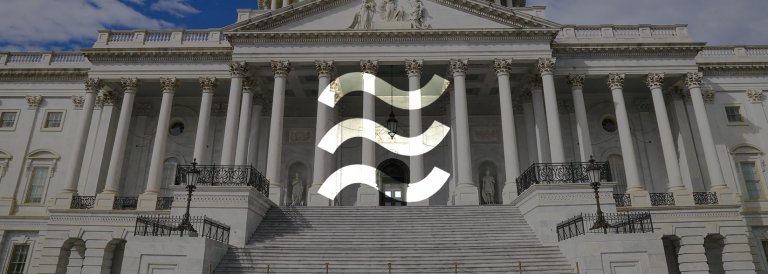 Senate hostile towards Libra, Facebook suggests regulators must act or risk losing US dollar dominance to Bitcoin
Senate hostile towards Libra, Facebook suggests regulators must act or risk losing US dollar dominance to Bitcoin Senate hostile towards Libra, Facebook suggests regulators must act or risk losing US dollar dominance to Bitcoin

Cover art/illustration via CryptoSlate. Image includes combined content which may include AI-generated content.
The focus of the hearing between Facebook’s David Marcus and the Senate on the Libra cryptocurrency was trust—or the lack thereof. Marcus, the head of Calibra, strongly suggested that if the U.S. doesn’t act quickly, Bitcoin could jeopardize the dollar’s dominance. Meanwhile, the Senate Committee was hostile towards the social media giant because of its history of ethical and regulatory violations.
David Marcus, the head of Calibra, testified before the Senate Committee on Banking, Housing, and Urban Affairs this morning to clarify issues around Libra, the cryptocurrency Facebook revealed last month.
Libra is Facebook’s proposed stablecoin backed by a basket of low-yield assets. Calibra, a subsidiary of Facebook, is one of many wallet applications that will allegedly exist on the Libra network. The application, similar to Venmo or PayPal, will utilize the cryptocurrency to settle payments while offering consumers fraud protections and will serve as the point of control for conducting know-your-customer and anti-money laundering checks on users.
According to the Libra whitepaper and testimony from Marcus, Libra will eventually be lead by a non-profit association of over one hundred member companies based out of Geneva, Switzerland. Some current members include Mastercard, Visa, Coinbase, and Uber.
Facebook attempts to placate regulators
“We will take the time to get this right. We expect the review of Libra to be the most extensive ever. We are fully committed to working with regulators here and around the world. And let me be clear and unambiguous. Facebook will not offer the Libra digital currency until we have fully addressed regulators concerned and have received appropriate approvals,” said Marcus in his opening testimony.
The Facebook executive’s appearance before the Senate Committee comes after Libra attracted national scrutiny from several divisions of the United States government.
The Federal Reserve Chairman, Jerome Powell, said Libra cannot go forward until Facebook addresses concerns around privacy, money laundering, and financial stability. The Secretary of Treasury Steven Mnuchin stated Facebook has a “lot of work to do” before convincing him to allow Libra to proceed. Even President Donald Trump tweeted “if Facebook wants to become a bank,” then they must be “subject to all banking regulations.”
“We strongly agree with both of them,” said Marcus, referring to the statements from Powell and Mnuchin.
That said, and even though Marcus is careful in claiming that Libra will not proceed until it is approved by regulators, he makes a clear call to action. He suggests that if policymakers do not act quickly, Bitcoin or another cryptocurrency could threaten the dominance of the dollar:
“I believe that if America doesn’t lead innovation in the digital currency and payments area, others will. If the country fails to act, we could soon see a [crypto]currency controlled by others whose values are dramatically different from ours.”
Senators respond with contempt
Yet, even with Marcus’s cautious remarks towards Libra’s approval, Senators from the Committee still responded with contempt because of the social media giant’s repeated ethical, privacy, and regulatory violations.
“Facebook is dangerous. Facebook might not intend to be dangerous, but surely, they don’t respect the power of the technology they’re playing with,” said Sherrod Brown, an Ohio Democrat. “Like a toddler who has gotten its hands on a book of matches. Facebook has burned down the house over and over and has called every arson a learning experience.”
For the entirety of the hearing Marcus was under fire for the myriad of scandals connected to Facebook. Backlash from incidents such as Russian election meddling, to Cambridge Analytica, to the platform’s role in the genocide of Rohingya Muslims dominated the hearing. Making matters worse, this week the FTC approved a $5 billion fine on Facebook for mishandling users’ data.
“I don’t trust Facebook, and it’s because of the repeated violations of user privacy and repeated deceit, and I am not alone,” stressed Arizona Republican Martha McSally. “The core issue here is trust.”
Nevertheless, Marcus iterated time and time again that the Libra multi-member association model, which currently includes over two dozen members, limits Facebook’s ability to influence the payment network. “Facebook is just one vote among many,” he told the Committee.
The Senators were not convinced. Facebook’s market power, vast resources, 2.4 billion person user base, and founding role in Libra would make it trivial for the company to assume de facto control over the supposedly decentralized payment system.
Libra is far from a lost cause, however. Many in the Committee were optimistic about the potential of blockchain and cryptocurrency. Although the senators were cautious about Libra, they were still willing to work with Facebook should the company be willing to seriously address their concerns.
“To announce in advance that we have to strangle this baby in the crib is widely premature,” stated Pat Toomey, a Pennsylvania Republican.
Senators bullish on blockchain, skeptical of Bitcoin
Unlike other hearings, those on the Committee appeared relatively knowledgeable about the potential of distributed ledger technology. As Senator Toomey continued:
“It’s widely premature to come to the conclusion that we have to act now to prevent what could be a very constructive innovation in financial services. I think there are tremendous potential benefits of blockchain technology and cryptocurrencies. It’s clear they could help us lower payment transaction costs, facilitate access to capital, provide pseudo-anonymity, and provide levels of security that other forms of currency have not.”
Senator Thom Tillis, a Florida Republican, added to the positive sentiment towards crypto, saying the United States should take a leading role in setting cryptocurrency regulation:
“The United States can either follow some other jurisdiction in pursuing this or we can lead it. In the same way we have the gold standard for the banking system in the United States, we have the opportunity to set an international standard that will ultimately provide greater consumer protections for a lot of the other upstart equivalents.”
However, there is still enormous uncertainty around the securities classifications, tax treatment, and legal status of crypto in the United States—allowing places such as Malta and Switzerland to take the lead (at least for now) in blockchain regulation.
Stances towards Bitcoin were mixed.
“What’s different [between Libra] from things like Bitcoin, is the uncertainty around Bitcoin, the uncertainty in its value, the wild fluctuations, mean, in my view, that it’s not going to be put into widespread use,” said Chris Van Hollen, a Maryland Democrat.
Could the dollar lose its grip over the global economy?
Having the U.S. dollar as the world’s reserve currency gives the United States leverage over foreign economies by imposing “extremely effective” sanctions, said Arkansas Republican Tom Cotton. The United States government can “blacklist” countries and people from accessing the global financial system by leveraging the dominance of the dollar. Current targets of this financial exclusion include Iran, North Korea and Cuba, crippling these economies.
In response to a question from New York Democrat Bob Memendez about blacklisting nation-states and bad actors, Marcus reminded him that the United States is at risk of losing the leverage of the dollar (to BTC).
“I really want to stress the fact that if we don’t lead, others will. And, as a result the transactions that you highlighted and listed, will happen on a network where we [the U.S.] will have no jurisdiction and no reach and no ability to exert any control for national security purposes.”
For Libra, the wallet providers and other “on and off ramps” would be responsible for conducting KYC and AML compliance. Those using Calibra would be required to reveal their identity and provide photo identification separate from Facebook’s social media platform. The Libra association will also register with money transmission regulator FinCEN, said Marcus.
Still, the Committee was unconvinced these measures would be sufficient.
“Traditional cryptocurrencies are not the first choice of drug cartels, terrorists, and human traffickers, because cryptocurrencies are not easy to use,” argued Senator Kyrsten Sinema.
…
“But Libra is not a cryptocurrency. It’s a digital currency that promises anonymity and ease of use, which raises concerns about its potential exploitation for illicit purposes. I have concern that drug cartels and traffickers may use Libra to finance operations along our southern border,” concluded the Arizona Democrat.
Nevada Democrat Catherine Cortez Masto added to Sinema’s concerns.
“This is a new day and age. When it comes to cash and carrying around a briefcase full of cash transnational criminals and terrorist activities don’t do that anymore. What you are creating right is an opportunity for them to continue engaging in money laundering and criminal activity.”
Marcus added, “we will respect the travel rule and perform the right checks, including OFAC checks. This is definitely true for the Calibra wallet.”
Act fast or be made obsolete
The final theme Calibra head David Marcus focused on was the United State’s precarious relationship with the dollar and its payments infrastructure.
“Every time the chairman of the Federal Reserve has come before this committee, I asked them why the United States government is so far behind our European partners and many others in real time payments. The fact that we don’t have a system in this country that can clear real time payments is, today, costing millions of Americans billions of dollars,” said Van Hollen. “They should accelerate their efforts and get it done. I personally don’t think we should hand that over to the consortium of the biggest banks in the country.”
Marcus agreed with this sentiment, asserting that if the U.S. doesn’t act, its position could be displaced by Bitcoin or another nation-state-backed cryptocurrency—such as the one China is exploring on.
“If we don’t lead in this space others will. In the same way we will end up having two internets and two different infrastructures, we will have two different financial systems and two different financial networks.”
Although the Facebook executive does not mention Bitcoin by name during his testimony, the theme of “falling behind” was mentioned in more than four instances during the hearing. Several, like the one above, had strong allusions to Bitcoin.
“One will be out of reach of the sanctions that are so effective at enforcing our foreign policy and preserving our national security. This is why I believe Libra is an alternative that consumers will have the ability to use with wallets that will de facto enforce the functions that are led by our national security apparatus and Treasury,” finished Marcus.
In other words, Marcus is reminding the Senate that if the U.S. government wishes to retain control over the money supply, and the global economy, that a solution like Libra is necessary. As said in another instance:
“If we stay put we’re going to be in a situation where in 10-15 years where we’re going to really have half the world operate, on, by the way, a blockchain based technology [Bitcoin] that will be out of reach from our national security apparatus.”
Still, the Senate Committee was more concerned about the trustworthiness of Facebook over the threat that Bitcoin, or any other payment network, poses to the U.S. financial system.
These concerns mean that Facebook is “definitely not moving fast” when it comes to Libra, as said by Marcus.
It seems that the risk to the U.S. financial system outweighed by Facebook’s infamy, for the time being. As Senator Brown effectively summarized:
“Why with all of your problems should we trust [Facebook] with something as important as a worldwide currency and the damage that can come from it.”
































































